In the dynamic realm of education, Educational Evolution represents the ongoing transformation in how we teach, learn, and understand the world. As society evolves, so too does the landscape of education, adapting to new challenges, opportunities, and technologies. This exploration delves into how educational practices are evolving and how stakeholders can navigate these changes to foster effective and inclusive learning environments.
1. Embracing Technological Advancements
Technology is a driving force behind the evolution of education:
- Digital Classrooms: Virtual and hybrid learning environments have become mainstream, offering flexibility and accessibility. Tools like learning management systems (LMS) and video conferencing platforms enable remote learning and collaboration.
- EdTech Innovations: From interactive whiteboards to artificial intelligence-driven tutoring systems, educational technology enhances engagement and personalizes learning experiences. Apps and software that support gamification and interactive content make learning more engaging and effective.
- Data Analytics: Leveraging data helps educators understand student performance and learning patterns. Analytics tools provide insights that inform instruction, identify areas for improvement, and support personalized learning paths.
2. Shifting Educational Paradigms
The traditional model of education is evolving to meet contemporary needs:
- Student-Centered Learning: Modern education emphasizes student agency and autonomy. Learners are encouraged to take an active role in their education, exploring topics of interest and pursuing projects that reflect their passions.
- Competency-Based Education: This approach focuses on mastering specific skills and competencies rather than adhering to a fixed timeline. Students progress based on their ability to demonstrate proficiency, allowing for a more personalized and flexible learning experience.
- Project-Based Learning: By engaging in real-world projects, students apply their knowledge in practical contexts, developing problem-solving skills, collaboration, and creativity. This method bridges the gap between theory and practice.
3. Adapting to Diverse Learner Needs
Educational evolution must address the diverse needs of learners:
- Inclusive Education: Ensuring that all students, regardless of their background or abilities, have access to quality education is paramount. This includes adapting teaching methods and materials to accommodate different learning styles and needs.
- Social-Emotional Learning (SEL): Recognizing the importance of emotional well-being in education, SEL programs focus on helping students develop self-awareness, manage emotions, and build healthy relationships.
- Cultural Responsiveness: Incorporating diverse cultural perspectives into the curriculum helps students connect with the material and promotes a more inclusive learning environment. Culturally responsive teaching practices acknowledge and value students’ cultural backgrounds.
4. Fostering Lifelong Learning
The concept of education extends beyond formal schooling:
- Continuous Learning: Lifelong learning emphasizes the importance of acquiring knowledge and skills throughout one’s life. Opportunities for professional development, online courses, and self-directed learning contribute to personal and career growth.
- Learning Communities: Engaging in communities of practice and networks allows individuals to share knowledge, collaborate on projects, and stay updated with industry trends. These communities support ongoing learning and professional development.
- Adaptive Learning Paths: Education systems are increasingly supporting flexible learning paths that accommodate various learning paces and interests. This adaptability helps learners pursue education that aligns with their personal and professional goals.
5. Navigating Educational Challenges
As education evolves, it faces several challenges that require thoughtful solutions:
- Equity and Access: Ensuring equitable access to educational resources and opportunities remains a critical challenge. Addressing disparities in access to technology, quality instruction, and support services is essential for fostering inclusive education.
- Balancing Technology and Human Interaction: While technology offers numerous benefits, maintaining a balance between digital and face-to-face interactions is important for building relationships and social skills.
- Preparing for the Future: Education systems must adapt to prepare students for an ever-changing world. This includes focusing on skills such as critical thinking, creativity, and adaptability, which are essential for success in the future workforce.
Final Thoughts
Educational Evolution is a testament to the resilience and adaptability of the learning process. As we navigate changing landscapes, embracing technological advancements, shifting paradigms, and addressing diverse needs are crucial for fostering effective and inclusive education.
By staying responsive to these changes and continuously seeking innovative solutions, educators, policymakers, and learners can collectively shape a future where education meets the needs of all individuals and prepares them for success in a rapidly evolving world.
